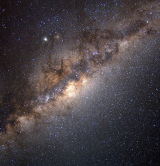
Extraterrestrial life
Overview
Latin
Latin is an Italic language originally spoken in Latium and Ancient Rome. It, along with most European languages, is a descendant of the ancient Proto-Indo-European language. Although it is considered a dead language, a number of scholars and members of the Christian clergy speak it fluently, and...
words: extra ("beyond", or "not of") and terrestris ("of or belonging to Earth")) is defined as life
Life
Life is a characteristic that distinguishes objects that have signaling and self-sustaining processes from those that do not, either because such functions have ceased , or else because they lack such functions and are classified as inanimate...
that does not originate from Earth
Earth
Earth is the third planet from the Sun, and the densest and fifth-largest of the eight planets in the Solar System. It is also the largest of the Solar System's four terrestrial planets...
. Referred to as alien life, or simply aliens, these hypothetical forms of life range from simple bacteria
Bacteria
Bacteria are a large domain of prokaryotic microorganisms. Typically a few micrometres in length, bacteria have a wide range of shapes, ranging from spheres to rods and spirals...
-like organisms to beings far more advanced than human
Human
Humans are the only living species in the Homo genus...
s.
The development and testing of theories about extraterrestrial life is known as exobiology or astrobiology
Astrobiology
Astrobiology is the study of the origin, evolution, distribution, and future of life in the universe. This interdisciplinary field encompasses the search for habitable environments in our Solar System and habitable planets outside our Solar System, the search for evidence of prebiotic chemistry,...
; the term astrobiology, however, includes the study of life on Earth, viewed in its astronomical context.
Unanswered Questions

